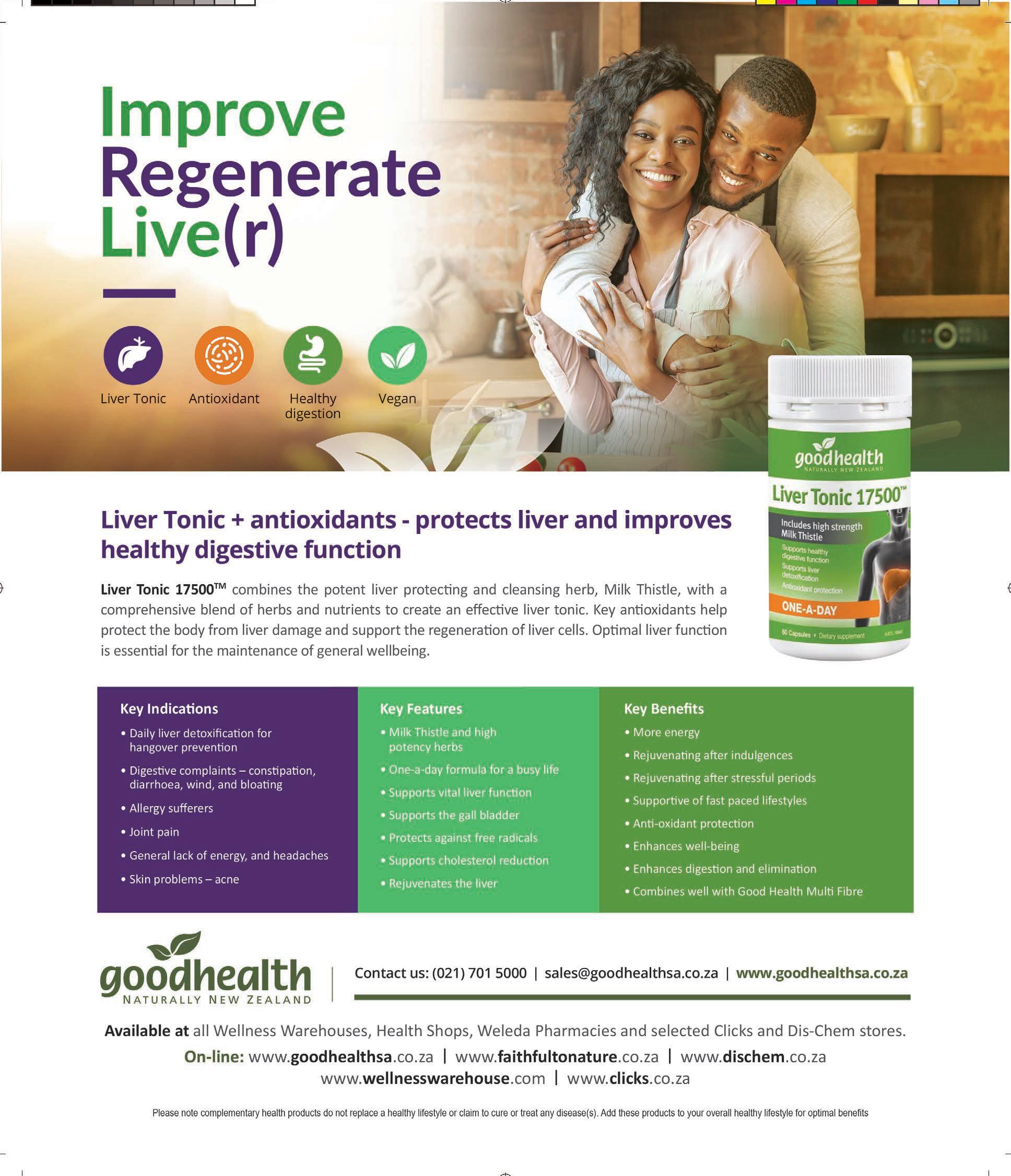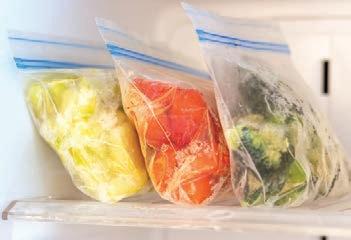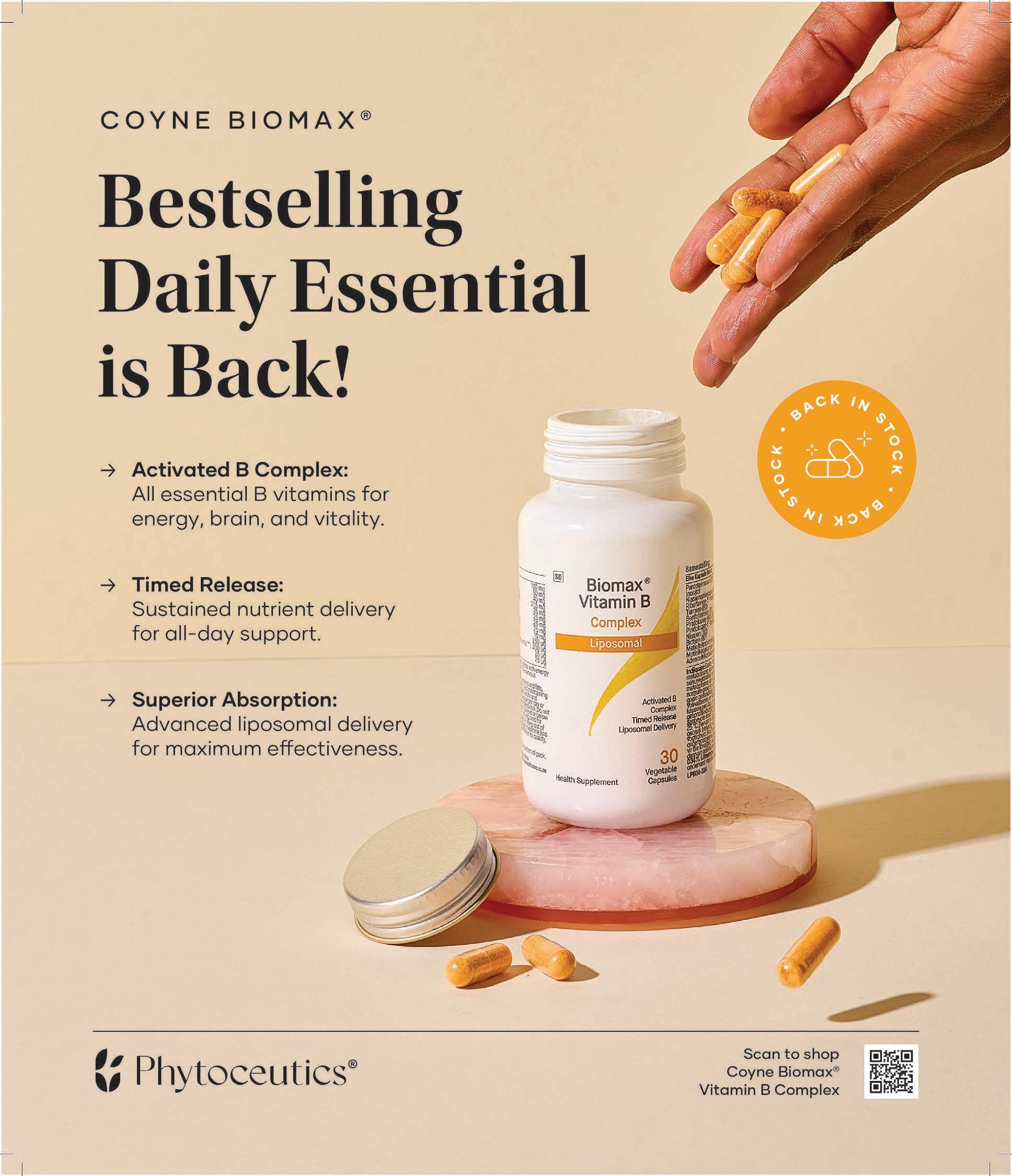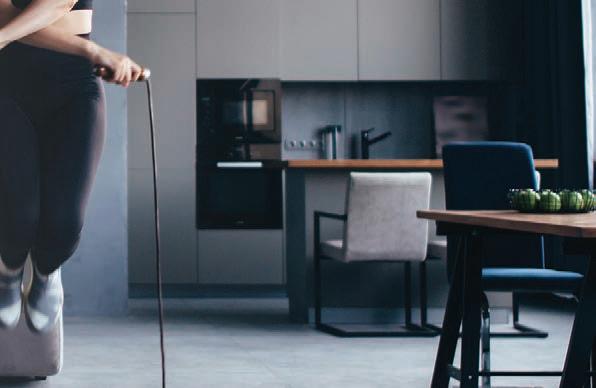






























































































































































Busy lifestyles mean we don’t have as much time to dedicate to self-care. When you’re not feeling at your best, or you’ve been pushing the limits, can be relied upon for help. Our premium supplements incorporate quality ingredients needed to help support our demanding lifestyles - whilst being safe and compliant with our regulatory requirements.

has been a clean-green New Zealand premium supplement brand since 1987 and is one of Australasia’s leading producers. Brand strengths are threefold:
• excellent high-strength formulations;
• using superior ingredient forms; and
• pharma-grade manufacturing compliance to strict local and international standards. Products are formulated by our naturopathic team who strongly believe in the benefits of herbs and nutraceuticals. Herbal medicine has been practised for thousands of years and today’s science enables us to prove much of “old wisdom” as factually relevant. All our hero ingredients are clinically researched, meaning product claims can be substantiated. offers exciting supplement delivery forms – such as sublingual dissolving tablets, tasty chewables, easy-mix powders and direct-to-mouth granular sachets and liquids – making regular supplement taking easier and more enjoyable.
And our production facilities are GMP certified – the international recognition of quality manufacture with highly scrutinised raw ingredients. Our facilities are run along strictly pharmaceutical protocols by pharmacists and their quality assurance teams.
As proof of product quality and success, the brand supplies growth export markets such as Australia, China, Hong Kong, Indonesia, South Africa, South Korea and Vietnam.
In 2001, the brand was launched in South Africa with our head office and distribution located in Cape Town. Health supplement importation and distribution
Our quality management team and responsible pharmacist control our regulatory compliance and product quality.
in South Africa requires approval and licensing by SAHPRA (South African Health Products Regulatory Authority), SAPC (South African Pharmacy Council) and NDOH (National Department of Health)
Our quality management team and responsible pharmacist control our regulatory compliance and product quality. Imported products are monitored during transit to South Africa and for temperature and humidity deviations while in our storage facility, ensuring what you buy in South Africa is the very same quality product manufactured in our New Zealand facility.
All products come with an attached Package Insert (called a PIL – the same as a pharmaceutical drug), outlining safety information, cautions and possible interactions.
In South Africa, we are a BEE compliant company offering high-level, professional service to our nationwide retailers and the public. Company representatives are qualified naturopaths, homeopaths or phytotherapists who understand the formulations and their application to the modern lifestyle. Reps visit retailers and practitioners on training calls, where on many occasions they interact with retail customers, helping them understand more about their own health and product choices. And 23 years on, can be found nationally at health shops, pharmacies, Wellness Warehouse, selected Clicks, Dis-Chem and Medirite+ stores and from Faithful to Nature and other quality online health platforms.
We applaud South Africans who take the day-to-day maintenance of their health into their own hands by supplementing their diet with quality products – leaving visits to the GP only for those serious or repetitive illnesses. But in a world where so many companies take shortcuts, use inferior ingredients and make outrageous claims, it’s important to be able to identify authentic companies and trustworthy products.

If you’re not happy with your purchase – for any reason – just contact us or your retailer and return it for a refund. This is how we stand behind our quality product range.
Let become your supplement range of choice and we’ll walk the path to better health together!








Q: How do you feel about winning races rather than breaking records, which is more important?
A: “I have feelings about this ahead of a race – the Comrades or Two Oceans for instance. As I won these events previously, the thought of winning will go through my mind. Regarding records, I try to remain logical in my approach. During training and race preparation, I need to find reasons to believe I can break the record or better personal best times. This is where I find confidence, but I know everything must go according to plan on race day.


We delve into the mind of elite runner Gerda Steyn to hear her views on what has contributed to her success as a world-class professional. By Herman Gibbs
there must be something in the water in the Free State. In 1984, a 17-year-old Free State girl named Zola Budd broke the 5 000m world record. Over the next 28 years, Budd won numerous international races culminating in a gold medal at the 1985 IAAF World Cross Country Championships in Lisbon, Portugal.
In 2017, another Free State athlete, Gerda Steyn, announced her arrival on the world podium by winning the Two Oceans Ultramarathon. She also won the next four Two Oceans events. Thrice she rewrote the record books.
Two Oceans’ sponsor Totalsports was so delighted that they declared the ultramarathon champ the G.O.A.T. (greatest of all time) after her fifth consecutive win.
Steyn again rose to world fame in 2019 when she won the Comrades Marathon, the ultimate human race. By June this year, Steyn had won the famous race for a third time. She holds the records for the “up” and “down” versions of the iconic KwaZulu-Natal event.
Steyn, dubbed “the smiling assassin”, often sports a beaming smile on the way to victory. Her phenomenal reputation has earned her the title of South Africa’s undisputed “Queen of the Road”.
“Even if I think I’m not in my best form, I’ll try to win the race. Of course, the hunger must be there. It makes you believe in yourself.
“I think it’s a dangerous game to focus only on the record. You have to win the race to break the record. You can break the record but still finish in second place. For me, this is not the right mindset.”
“During training and race preparation, I need to find reasons to believe I can break the record or better personal best times. This is where I find confidence.” – Gerda Steyn
Q: What role does your mindset play in a race?
A: “The importance of mindset cannot be underestimated. The athlete must be aware of it while training and racing. In training, you practice being mentally prepared for a race. Be certain your mind doesn’t wander and stay focused from start to finish.
“Even if it’s a long race, it’s still a short period in the bigger context of things. If you have mastered this in training, you’ll be prepared to remain focused on race day when other factors are at play, some of which cannot be replicated in training. For example, you will not be training with hundreds of people lining your training venue.”
Q: What about motivation?
A: “The best way to motivate myself is to find motivation within myself. External motivation is good, but you have to have that inner drive in you. You have to wake up in the morning wanting to train. You must desire to do better, even if it is a little bit – that is crucial for me. I don’t know how I would perform if I didn’t feel that internal drive.”
The phenomenal Gerda Steyn holds all the women’s records of South Africa’s iconic road races, the Two Oceans and Comrades Marathon. Her Two Oceans (56km) record stands at 3:26:54 (2024). She is also the holder of the alternated up and down versions of the Comrades. The records are Up (approximately 85.9km): 5:44:54 (2023) and Down (87.7km): 5.49.46 (2024).
No runner, male or female, has ever achieved the distinction of holding all five records simultaneously.




Mbali Mapholi, Laager Rooibos partner dietitian, explains that the challenge is finding affordable yet nutritious food options
the rising cost of living in South Africa is putting the goal of a healthy diet out of reach for many households. As the price of essential foods, such as vegetables, lean proteins and whole grains, skyrockets, it’s becoming increasingly difficult for families to eat nutritiously. Nutrition should be a right, not a privilege, yet it’s becoming a luxury for too many South Africans.



Recent reports show that the cost of a basic food basket has risen by over 10 per cent in the past year, placing further strain on low- and middle-income households. Staples, such as maize meal, rice and bread – the key elements of many South African diets – are becoming more expensive. This forces people to choose between quantity and quality with many opting for cheaper, highly processed foods. While these fill stomachs, they lack the essential nutrients needed for good health and disease prevention.

Ultra-processed foods come at the expense of health – they lack vital nutrients, such as fibre, vitamins and minerals. Whole foods, such as vegetables, fruits, legumes and grains, offer much-needed nutrition but often come with higher price tags, making it difficult for households on a budget to incorporate them regularly. However, there are ways to navigate these challenges. One key strategy is to focus on seasonal and locally grown produce, which is often more budget-friendly and fresher than imported options. For example, vegetables, such as spinach, morogo and butternut, are locally grown, affordable and packed with nutrients. Incorporating affordable proteins, such as beans, lentils, eggs and canned fish, can provide necessary nutrition without breaking the bank.
SEVEN TIPS TO STRETCH YOUR BUDGET TO INCLUDE HEALTHY OPTIONS
1. PLAN MEALS
Creating a weekly meal plan helps minimise food waste and allows you to make more intentional, healthy choices. Planning meals around affordable staples, such as legumes, whole grains and seasonal vegetables, can reduce costs while maintaining a nutritious diet.
2. BUY IN BULK
Staple foods, such as rice, beans and lentils, are cheaper when bought in bulk. These foods are also versatile and can be used in various meals throughout the week.

3. COOK AT HOME
Home-cooked meals are generally more affordable and healthier than eating out or buying pre-packaged meals. Preparing simple dishes, such as vegetable stews, soups and salads, allows for more control over ingredients and portion sizes.
4. FREEZE LEFTOVERS
Freezing extra portions helps avoid food waste and provides quick, healthy meals on busy days.
5. CHOOSE SUPERFOODS

FOR MORE INFO, VISIT JOEKELS.CO.ZA OR FOLLOW LAAGER ROOIBOS ON FACEBOOK AND INSTAGRAM (@LAAGERROOIBOSTEA) READ NOW
Certain foods are incredibly nutrient-rich and worth adding to your diet. Nutritious yet affordable superfoods include sweet potatoes, beans, oats and rooibos. At around 55c for a cup of Laager Pure Rooibos, it’s an affordable choice that’s full of benefits.
6. CHOOSE HEALTHY HYDRATION
Rather than buying cordials, sodas or fruit juices that are packed with sugar, choose water or rooibos as your source of hydration. These options are cheaper and better for you. Laager Rooibos comes in a range of flavours that can be used to make iced teas at home – simply cool the rooibos and add a small amount of sugar/honey and fresh fruit.
7. GROW YOUR OWN FOOD
Even in small spaces, growing herbs, spinach or tomatoes can reduce costs while providing fresh produce at home.






Four reasons why letting your baby get messy with food boosts their development. By Jen Spiro, an occupational therapist
when first introducing your baby to solid foods, it’s usually easy to keep things tidy since they’re not yet very mobile. However, as the months pass, they’ll start grabbing the spoon and blowing raspberries with food in their mouth, which can quickly turn into a messy affair for everyone involved. This can feel overwhelming and letting them be messy might seem like more trouble than it’s worth. Some parents feel uncomfortable seeing their child covered in food, even during mealtimes, as it can seem untidy or neglectful. But I encourage you to embrace the mess! Let your babies get food on their hands, in their hair and over their face – and try to resist the urge to pull a face or make negative remarks. Here are four good reasons to welcome the mess.
Stimulating sensory play


3. Preventing tactile defensiveness
Without exposure to different textures, some children become sensitive to new or unfamiliar sensations. If you keep your baby very clean during meals, they may find getting messy uncomfortable in the future. While tactile defensiveness isn’t always learned – some children are naturally more sensitive – frequent wiping can reinforce discomfort. Letting them experience different textures helps reduce the risk of this sensitivity.
4. Making mealtimes enjoyable
Mealtimes for babies are more than just about feeding; they’re a gateway to sensory play. Babies are born with around five times as many nerves in the brain dedicated to receiving and organising sensory information compared to those needed for movement. This allows them to use their senses to explore the world around them. While you can’t let your seven month old play in a sandbox or finger paint due to the risk of ingestion, mealtime offers a safe space for them to experience messy textures. This type of tactile stimulation helps their brain process and respond to new information, actively engaging their curiosity and sense of exploration.
As babies get food on their hands, they’ll eventually realise that putting their fingers in their mouths brings food. This important discovery helps them understand that they can feed themselves. Although they may take a few months to master spoon-feeding, these early finger-food experiences lay the groundwork for future self-feeding. It also aids in the development of fine motor skills as they begin to learn how to use their hands and fingers in a controlled way. If your baby is getting messy but isn’t yet bringing their hands to their mouth, gently guide them.
Mealtimes for babies are more than just about feeding; they’re a gateway to sensory play.
Allowing babies to get messy can make mealtimes more relaxed and enjoyable. Starting solids should foster a positive relationship between your baby and food. Constantly cleaning them or trying to pin them down for a wipe after each bite can make mealtimes stressful for both of you. Aim to make these moments calm and enjoyable for everyone involved.

To help with the mess, why not get your kiddo a nurtureOne Fuss
Free bib designed to help you let your baby explore their food and develop a healthy, happy relationship with eating? The bib encourages self-feeding, promotes hand-eye co-ordination and nurtures early food curiosity. It protects your baby’s clothes, is easy to wash and dries quickly. It also includes a convenient pouch for easy storage and travel.

Murray Hewlett , CEO of Affinity Health, explores the benefi ts and tips for incorporating tummy time into your baby’s daily routine


Murray Hewlett shares top tips on establishing good sleep practices
• Consistent bedtime routine: establish a calming pre-sleep routine that starts at the same time every night.
• Set a regular sleep schedule: ensure your child goes to bed and wakes up at the same time every day, including weekends.
• Limit screen time: encourage your child to avoid screens (TV, tablets, smartphones) at least an hour before bedtime.

ummy time is a simple yet crucial practice for infants that involves placing them on their stomachs while awake and supervised. According to the National Institute of Health, tummy time can profoundly impact an infant’s growth and future motor skills.
From building physical strength to enhancing cognitive skills, tummy time offers many benefits that lay the foundation for your baby’s future milestones. Let’s explore the advantages of incorporating tummy time into your baby’s daily routine.
1. Muscle strengthening
When babies are placed on their stomachs, they are encouraged to lift their heads, which strengthens the neck and shoulder muscles. These actions also promote the development of the muscles in the arms and back, providing a foundation for rolling over, crawling, sitting and eventually walking.
2. Preventing flat head syndrome
A baby’s skull comprises flexible plates that act like moving puzzle pieces, allowing the head to grow. These pliable bones are excellent for protecting your baby’s developing brain. However, they can flatten if your baby spends much time lying on their back. Some babies also come into the world with misshapen heads due to their position in the womb or their journey through the birth canal. Tummy time helps distribute the pressure more evenly across the baby’s skull, reducing the risk of developing flat spots and promoting proper head shape.
• Create a sleep-conducive environment: to help your child sleep better, ensure their bedding (mattress, pillow and blankets) is comfortable. The room should be quiet, dark and calm. If noise or light is an issue, try using a white noise machine or a fan to create a steady background sound and invest in blackout curtains.
• Address psychological factors: teach your children ways to manage stress and anxiety, such as deep breathing exercises, progressive muscle relaxation, or mindfulness meditation. If your child’s insomnia is related to anxiety, depression or other psychological issues, a therapist or counsellor can be beneficial. Cognitive-behavioural therapy for insomnia is a highly effective treatment for insomnia.
• Parental involvement: parents should model good sleep habits themselves. Children often mimic their parents’ behaviours so demonstrating the importance of a healthy sleep routine can have a positive impact. Rewarding your child for following their sleep routine and achieving sleep goals can encourage good habits. Simple rewards like stickers or extra playtime can be effective motivators.
When babies spend time on their tummies, they get a new perspective on the world around them. This helps them explore their surroundings more, boosting their visual and sensory development. They start to look around, reach for toys and react to different sights and sounds, all of which help spark their curiosity and learning.
EXPERT TIP: What if my baby falls asleep during tummy time?
If your baby falls asleep during tummy time, gently turn them onto their back and transfer them to their cot or crib.

As babies lift their heads, arms and legs during tummy time, they practise co-ordination and balance. These early experiences are critical for developing the neural pathways that support complex motor skills later in life, such as running, jumping and throwing.
Tummy time is a great bonding experience for babies and parents. Engaging with your baby during tummy time through eye contact, talking and playing can strengthen the emotional connection and reassure the baby.

Building strength where it matters most –discover the best exercises to keep your bones and joints healthy, flexible and ready for life’s adventures.
By Murray Hewlett, CEO of Affinity Health
1. Weight-bearing exercises


Weight-bearing activities, such as walking, jogging and hiking, stimulate bone growth and help maintain bone density. Research shows that people who regularly engage in these activities tend to have stronger bones than those with a sedentary lifestyle.
2. Strength training


Strength training, including weightlifting and resistance exercises, helps increase bone density, especially in areas prone to osteoporosis such as the spine and hips. Squats, lunges and deadlifts are great options to incorporate into your routine.
3. Tai Chi
This low-impact exercise involves slow, controlled movements that enhance bone density and joint stability. Tai Chi also improves balance and co-ordination, which reduces the risk of falls and fractures.
4. Yoga
Yoga enhances bone and joint health through poses that build balance, flexibility and strength. Regular practice can reduce stiffness, boost bone density and improve alignment, protecting joints from daily stress.







5. Pilates
Pilates strengthens core muscles and enhances flexibility, especially around the spine and hips. It’s low-impact and suitable for all ages, making it a great option for long-term joint health.
6. Swimming
Although not weight-bearing, swimming builds muscle strength and improves joint flexibility. The water’s buoyancy reduces pressure on joints, making it ideal for those with arthritis.
7. Cycling
Cycling strengthens muscles around the knees, hips and ankles without putting too much strain on these areas. It also improves cardiovascular health and is beneficial for those with knee osteoarthritis.
8. Stair-climbing



Stair-climbing is a convenient way to strengthen bones and muscles in the legs, hips and spine. Regular stair-climbing can increase bone density, especially in the femur, reducing fracture risk.
9. Jumping rope
Jumping rope is a high-impact activity that’s twice as effective as jogging for increasing bone density. It also builds leg muscles and improves joint stability.
10. Stretching





While stretching doesn’t directly increase bone density, it promotes flexibility and prevents stiffness. Stretching before and after workouts reduces strain and keeps the muscles and ligaments around joints healthy.



Think your stomach is invincible? Think again! From heartburn to hangovers, CEO of Affinity Health Murray Hewlett shares why mindful not binge drinking is your gut’s new best friend
while a night out might seem like harmless fun, binge drinking can have lasting effects on more than just your head the next day. The digestive system takes a hit too, from acid reflux to long-term risks such as liver disease and nutrient deficiencies. This guide explores simple yet effective ways – whether pacing yourself, staying hydrated or eating smart – to protect your digestive health without giving up the occasional drink. Read on to discover how mindful choices can make all the difference for your gut and overall wellbeing.
MODERATION AND MINDFUL DRINKING








alcoholic drinks and staying hydrated can help reduce some of alcohol’s immediate effects on your digestive system.
The best way to avoid the adverse effects of binge drinking on your digestive health is to drink in moderation. Moderate drinking means up to one drink a day for women and up to two for men.
Alcohol acts as a diuretic, which means it makes you urinate more and can cause dehydration. To counter this, drinking water between
Storing your medicine in the bathroom? Don’t do it! Learn the dos and don’ts of safe storage.
By Tanya Ponter, executive at Dis-Chem
you may think your medicines are stored safely in the correct place, but you might be overlooking some key factors. Proper storage is crucial to prevent damage and ensure medications remain effective. Incorrect storage of medicine can lead to pills or tablets becoming damaged or expiring prematurely, leading to ineffectiveness and possibly making them unsafe to consume.
Bathroom medicine cabinets are not ideal due to the heat and humidity. Bathroom doors are often closed for long periods and steam coming from baths and showers can cause a deterioration in medication, leading to them losing their efficacy.
Eating food before and while drinking can help slow the absorption of alcohol into your bloodstream, reducing the intensity of its effects on your digestive system. Food helps to buffer and dilute the alcohol, giving your body more time to metabolise it. By eating, you can also avoid sudden spikes in blood alcohol levels, leading to less severe hangovers and fewer harmful effects on your digestive health.
For individuals who struggle with controlling their drinking, seeking help is crucial. Support groups, counselling and medical interventions can provide the necessary tools and support to manage alcohol consumption and improve overall health.
Light is well known to affect certain drugs negatively. Excess exposure can cause loss of potency and disintegration of tablets and have adverse side effects. It can also reduce the concentration of the active ingredient present. Medicine needs to stay dry and cool and certain medicines need to be stored in a fridge, but your doctor or pharmacist will advise you on this.
As well as thinking about where your medicines are kept, you must think about what they are kept in. Categorise your medicines in a divided box or separate boxes instead of throwing all of them into one basket. This will prevent mismanagement and help keep track of the expiry dates of your medicines.

Lastly, and most importantly, you need to check your medicine dates. Read the labels, check the expiry dates and review all medicines. Remove expired and unwanted medicines from the packaging and place them in a bag or container and return them to your local pharmacy for safe disposal.



Hein Hofmeyr, a clinical psychologist practising at Netcare Akeso Nelspruit, shares how to support a loved one struggling with depression



while global mental health awareness has grown, South Africa still faces a stigma around depression that affects home, school and work environments. Depression impacts approximately one in six South Africans, making it the country’s most common mental health concern. But would you recognise the signs in yourself, a loved one or a colleague?
Depression manifests in different forms, but persistent sadness, emptiness or irritability, combined with significant life disruptions, are common indicators. While it’s not necessary to understand clinical definitions, certain symptoms should raise concern if they persist for over two weeks without a clear external cause. These signs include:
• Withdrawal from social interactions.
• Low self-esteem and negative self-talk.
• Feelings of hopelessness, helplessness and loneliness. A common misconception is that depression always involves suicidal thoughts, but this isn’t necessarily the case. Depression can sometimes signal an increased risk of future suicidal behaviour, but not every person with depression will experience suicidal thoughts. If we notice signs of depression in a friend, family member or colleague, our support could help prevent irrational thinking and impulsive behaviours that might lead to self-harm. When these warning signs appear, encourage the person to seek professional help.
Depression often stems from feelings of hopelessness, helplessness and loneliness. Helping someone find moments of hope or something to look forward to can make a difference in navigating each day. However, supporting a loved one through depression can be challenging. It’s crucial to approach the topic in a safe, nonjudgemental environment where they feel secure enough to open up without fear of ridicule.
In a depressed state, it can be incredibly difficult to see a way out. Treatment, which includes medication and psychotherapy, empowers individuals to manage their thoughts, emotions and behaviours. While professional help is essential, certain lifestyle habits are also key to managing depression.
Good sleep hygiene, a balanced diet, regular exercise, meaningful social connections, self-care and personal pursuits, such as



Helping someone find moments of hope or something to look forward to can make a difference in navigating each day.
education, spirituality or career goals, are all foundations for mental wellbeing. Think of these as the legs of a table: when they’re balanced, the weight of life’s challenges can be managed without overwhelming us. Even though depression can make achieving these goals feel impossible, working towards them can restore a sense of control. Self-empowerment helps to lessen feelings of helplessness by focusing on what we can control: our attitudes and reactions. Connecting with others can alleviate loneliness while avoiding isolation can be crucial for managing depressive episodes.
The journey to overcoming depression also includes breaking the stigma attached to it. Being able to speak openly and confidently about mental health challenges is the first step in normalising the conversation around depression. With one in six people in South Africa affected by depression, finding someone who understands your experience is possible, and professional help is available.
Knowing you’re not alone can be a powerful relief and a first step towards overcoming depression. Addressing the needs of those affected and encouraging open discussion about mental health will help replace the isolation, hopelessness and helplessness associated with depression, allowing for a brighter outlook and a stronger support system.
If you are experiencing depression, have thoughts of harming yourself or any mental health-related concerns, Netcare Akeso offers a 24-hour crisis line on 0861 435 787. Trained counsellors are available to listen without judgement and can guide you on the various options for assistance, including help accessing support for a loved one.

